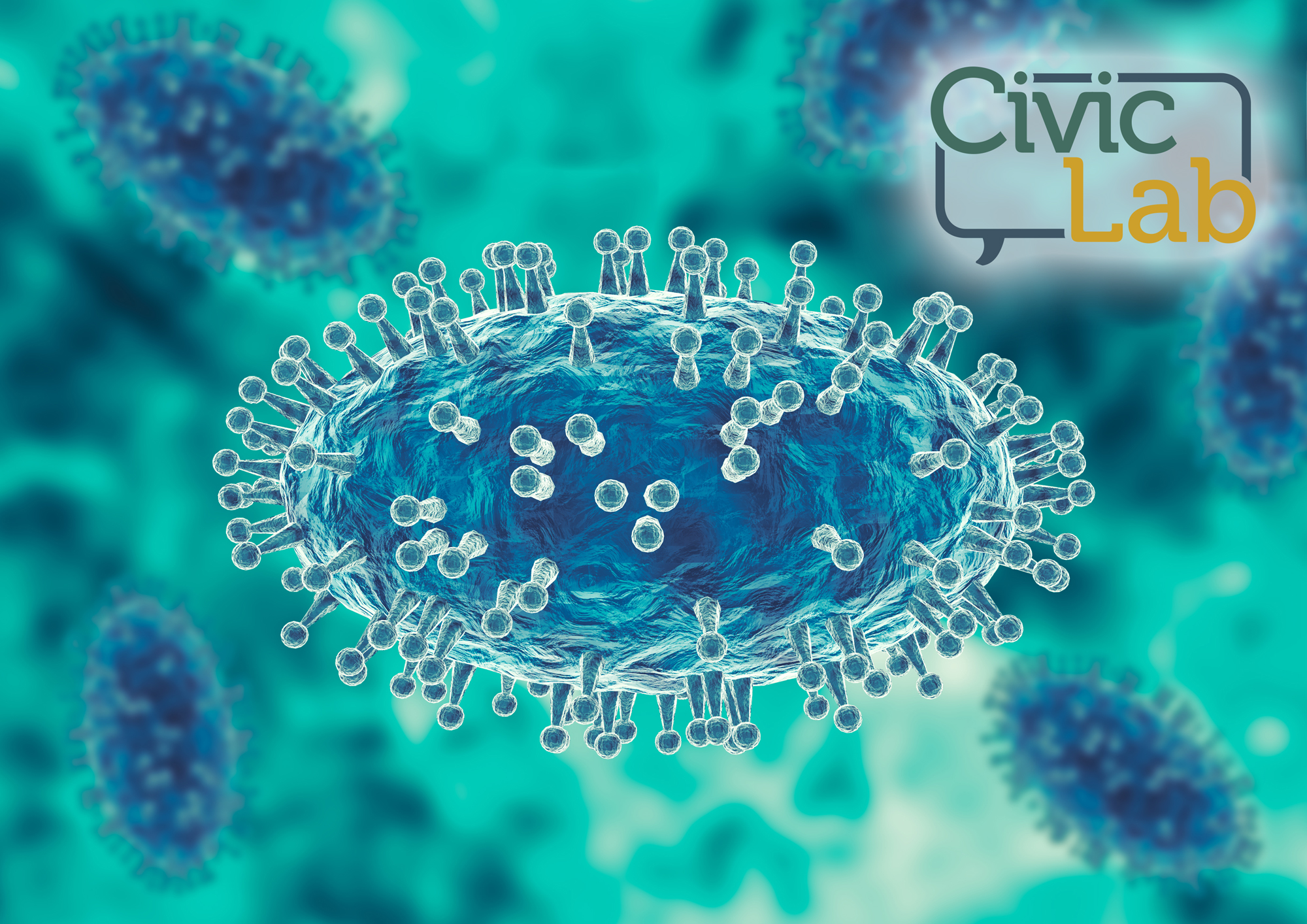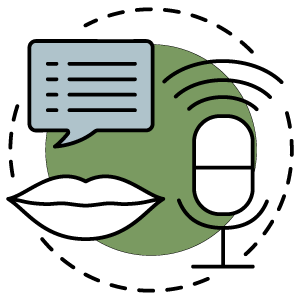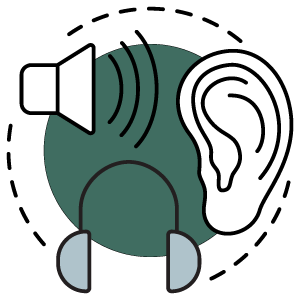Civic Lab Online: What is monkeypox?
Posted on September 1, 2022 at 6:00 am

About Civic Lab Online
Civic Lab Online provides information on issues facing our community for you to explore. Take a look at thought-provoking materials for teens and adults that allow us to engage in open conversation and grow together as a community. You’ll find all past topics on the Civic Lab Online web page.
Monkeypox: Fast Facts
The monkeypox virus has made headlines as new cases appear in countries where it isn’t typically seen. Health organizations are tracking the virus, and Washington state recently began to see diagnosed cases. What do we know about monkeypox?
Is monkeypox a newly discovered virus? How fast is it spreading? Why is it called “monkeypox”?
Monkeypox was discovered in 1958 when two outbreaks occurred in colonies of monkeys used for research. No one knows if it originated in monkeys or another animal. It has also been found in rodents.
- Monkeypox is zoonotic, a microbiological disease that can be transmitted from animals to people.
- The first human case was reported in 1970. Prior to 2022, minor outbreaks occurred, mainly involving animal carriers or international travelers.
As of July 2022, epidemiologists have identified two primary families, or clades, of monkeypox: a Congo Basin clade and a West African clade. Both are now considered endemic (regularly found among the population) in those areas. The current outbreak is from the West African clade.
The U.S. identified its first monkeypox case on May 4, 2022. Within eight weeks, the U.S. monkeypox case count increased to 460 cases across 30 states. The U.S. currently has over 18,000 cases as of August 30, 2022. The first case in Spokane was reported on July 29, 2022.
The Center for Disease Control (CDC) is currently monitoring reports from countries that don’t usually report outbreaks of monkeypox, including the U.S. The World Health Organization (WHO) reports more than 16,000 recent cases were reported in at least 75 countries across every continent but Antarctica.
On July 23, 2022, WHO officials declared monkeypox to be a public health emergency of international concern in accord with International Health Regulations criteria. This means it is serious, unusual, or unexpected; carries implications for public health beyond the affected country’s national border; and may require immediate international action.
- About 90 percent of the epidemic cases outside the normal endemic regions have been among men, with other cases occurring primarily in family members and caregivers. A disproportionate number of men who have sex with men (MSM) have been affected, which has resulted in slower identification of the disease in other groups and has slowed international emergency warnings because not all vulnerable groups have been affected.
- Health officials stress that any person can contract monkeypox.
- Younger children run an increased risk of developing a more severe case of the disease, but very few cases have been reported: only two in the U.S. as of August 3, 2022.
How do you know if you might have monkeypox? Are there tests and vaccines available?
Monkeypox symptoms include fever, headache, muscle aches, backache, exhaustion, swollen lymph nodes, and a papular rash (raised bumps on the skin).
- Clinical symptoms usually appear approximately 13 days after non-invasive exposure (skin contact or droplet transmission) and approximately 9 days after invasive exposure (contact with broken skin or sexual contact). Symptoms seldom appear after 21 days past exposure, so a 21-day quarantine is recommended for people who have been exposed to monkeypox.
- The papular rash typically appears on the face before spreading across the body. The illness normally lasts 2–6 weeks, and a person is no longer infectious when the rash lesions have crusted, fallen off, and new skin has grown over them.
- More severe disease develops in about 10 percent of cases. Treatment for severe cases may include antiviral medications, such as tecovirimat (TPOXX). Complications of monkeypox often include secondary skin infections, pneumonia, and encephalitis. Less than 1 percent of patients who contract monkeypox die.
- Some recent cases have been without fever, and the lesions appearing in the genital and perianal regions. This has caused it to be confused with other infections or STIs.
It is unknown whether infected people with no symptoms can spread the disease.
Monkeypox is in the same family as the variola virus, which is the virus that causes smallpox, but monkeypox is far less deadly. Due to the fear of smallpox as a biological weapon, research and vaccines that already exist have given healthcare workers a head start on treating and vaccinating for monkeypox.
Although an approved vaccine designed for monkeypox exists, supplies are low. The vaccine has been mainly used to immunize healthcare workers treating monkeypox patients and those involved in lab research.
Some U.S. cities have begun to offer monkeypox vaccine to civilians but have quickly run out, in part because the Department of Health and Human Services did not ask soon enough for owned bulk stocks to be bottled for distribution. The government is now distributing about 1.1 million doses, less than a third of the estimated 3.5 million needed to fight the outbreak. The next delivery of a half-million doses is expected in October 2022. Most of the other 5.5 million doses the U.S. has ordered are not scheduled to be delivered until 2023.
The smallpox vaccine has also proven to be about 90 percent effective in preventing monkeypox, but the harsh side effects make taking precautions a better option. Those who received the smallpox vaccine in the early 1980s or earlier, before smallpox was eradicated, seem to have some protection against monkeypox.
Expanded testing options are on the way. By the end of June 2022, less than 10 percent of the available nationwide Laboratory Response Network (LRN) testing capacity had been used. Expansion of testing to five commercial laboratories started the week of July 5 and should make polymerase chain reaction (PCR) rapid testing more accessible. This should increase convenience for doctors by eliminating the need for prior public health approval and make containment of outbreaks more efficient.
Read. Watch. Listen.

READ
“Stanford-based initiative WastewaterSCAN will monitor wastewater for COVID-19, monkeypox, influenza A, and RSV genetic markers to help guide public health responses.” Stanford News, Stanford University, 5 August 2022.
Labs that test wastewater, especially in college dorms, to isolate who needs to be tested for Covid-19 before symptoms occur are preparing to apply the same technology to testing wastewater for monkeypox. This early detection method has helped prevent outbreaks in the past by allowing early testing and quarantine.
LeFraniere, Sharon and Noah Weiland. “U.S. Moves to Stretch Out Monkeypox Vaccine Supply.” The New York Times, via ProQuest, Proquest.com, 8 August 2022.
The Biden administration requests permission from the Department of Health and Human Services to try a new vaccination method involving injecting a one-eighth vaccine dose into the skin rather than injecting a full dose in order to stretch vaccines to more people.

WATCH
“Monkeypox numbers, treatment and prevention with two CDC experts.” American Medical Association, 14 July 2022.
Two experts from the Centers for Disease Control and Prevention’s (CDC) Division of High-Consequence Pathogens & Pathology in Atlanta, Caroline Schrodt, MD, and Jennifer McQuiston, DVM, talk with the American Medical Association about what physicians need to know about monkeypox, including the latest numbers, how it spreads, vulnerable populations, common symptoms, and available treatments and testing.

LISTEN
NPR. “As U.S. Declares Monkeypox a Public Health Emergency, What to Know About the Risks.” Consider This, NPR.org, National Public Radio, August 5, 2022.
A researcher of infectious disease in New York City describes the experience of having monkeypox and the difficulty of obtaining a vaccine. Critics weigh in on whether the response has been too slow and what the White House task force is doing now. NPR Health Correspondents Pien Huang and Michaeleen Doucleff discuss how casual contact is unlikely to transmit monkeypox.
Digital Resources
Gale: Health & Wellness
Learn more about monkeypox with this digital resource.
Print & Other Materials in Our Catalog
Search our catalog for books, large print, eBooks, and audiobooks on any topic.
Downloadable Documents
Monkeypox: Fast Facts
Monkeypox: Read. Watch. Listen.
Monkeypox: Sources
Tags: civic lab, civics, community, disease, health, monkeypox, wellness

